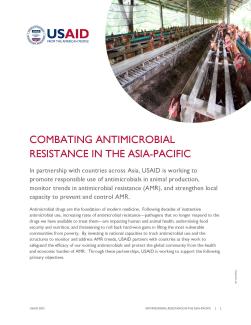In partnership with countries across Asia, USAID is working to promote responsible use of antimicrobials in animal production, monitor trends in antimicrobial resistance (AMR), and strengthen local capacity to prevent and control AMR.
Antimicrobial drugs are the foundation of modern medicine. Following decades of inattentive antimicrobial use, increasing rates of antimicrobial resistance—pathogens that no longer respond to the drugs we have available to treat them—are impacting human and animal health, undermining food security and nutrition, and threatening to roll back hard-won gains in lifting the most vulnerable communities from poverty. By investing in national capacities to track antimicrobial use and the structures to monitor and address AMR trends, USAID partners with countries as they work to safeguard the efficacy of our existing antimicrobials and protect the global community from the health and economic burden of AMR. Through these partnerships, USAID is working to support the following primary objectives.
RAISING AWARENESS ON ANTIMICROBIAL RESISTANCE
Building a robust understanding of the drivers of AMR in human health and livestock production settings is a cornerstone of good antimicrobial stewardship practices in Asia. USAID support is developing and delivering targeted education and training materials, launching advocacy and social media campaigns, and promoting an enhanced awareness of the causes—and solutions—in the battle against AMR. Through the annual celebration of World Antibiotic Awareness Week, USAID fosters regional engagement and advocacy that will help generate a groundswell of action in mitigating AMR impacts.
IMPROVING UNDERSTANDING OF ANTIMICROBIAL USE
Developing structures to monitor antimicrobial use helps direct targeted interventions and promote sound antimicrobial stewardship while ensuring access to life-saving antimicrobials in under-resourced communities. Data from these activities will inform the development of awareness and communication tools, supporting actionable steps and best practices to measurably reduce rates of AMR.
ENHANCING MONITORING AND SURVEILLANCE OF AMR
With USAID support through the Food and Agriculture Organization (FAO), a set of five surveillance guidelines are being developed to directly support national veterinary and livestock production authorities in Asia in the design and implementation of critical AMR surveillance programs. Flagship activities include assessments of national AMR action plans, training national authorities charged with surveillance systems and laboratories, and support to countries’ AMR multi-sectoral surveillance activities. USAID’s partnership with Chulalongkorn University delivers regional support, and Chulalongkorn’s Faculty of Veterinary Science has been globally designated as an FAO AMR Reference Center.
HARNESSING THE POWER OF NETWORKS AS CHANGE AGENTS
Through USAID support, academic and private sector networks are being leveraged to promote antimicrobial stewardship in Asia. New activities are harnessing the reach, influence, and financial and technical support of these networks, and advocating across their constituencies for adoption of best practices in livestock production. Academic networks are training a new generation of health practitioners promoting sound antimicrobial stewardship in their communities.
PROMOTING LOW RISK PRODUCTION SYSTEMS
Safe and secure food production systems must be capable of meeting the growing demand for animal source foods without reliance upon routine antimicrobial use. USAID technical assistance to terrestrial and aquatic animal producers is facilitating a transition to improved husbandry and management, including through enhanced vaccine coverage, on-farm biosecurity, and targeted nutrition and probiotics. Healthy animals and production systems eliminate the need for non-therapeutic antimicrobials, enhance productivity, and deliver stronger returns for farmers, protecting communities from AMR while improving rural livelihoods.


